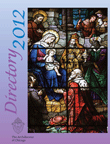Catholic Health Association
offers message of faith
Catholic health care institutions should wear their faith on their sleeves, as it were, according to a panel at the 92nd Catholic Health Assembly in Chicago June 19.
The assembly, which brought nearly 1,100 leaders from the hospitals, nursing homes and health systems that make up the Catholic Health Association to the Marriott Magnificent Mile in Chicago June 17-19, included presentations and workshops on ethics, pastoral care, leadership and improving access to health care.
Father William Grogan, Cardinal George's liaison to health care in the archdiocese and system director for ethics for Provena Health; Jesuit Father John Piderit, former president of Loyola University Chicago and president of the Catholic Education Institute; and Melanie Morey, senior director of research and consulting for the Catholic Education Institute offered a workshop on strengthening Catholic institutional culture.
The topic takes on importance given recent court decisions in New York and California that have questioned whether Catholic social service and health care providers continue to have a distinguishable religious identity, said Grogan, who is also a civil lawyer.
The panel talked about ways to maintain the Catholic culture of institutions that long relied on the examples set by the religious congregations that operated them. One way to maintain that culture, they suggested, is to identify a core group of Catholic staff members who see themselves "as healers in the larger context, in the context of Christ's healing ministry," Morey said.
That cadre could lead initiatives such as scheduling a daily service to pray for all the patients in the hospital, or starting a monthly healthy dinner for the poor which the hospital staff could serve.
Hospitals also could reach out to local parishes, having Masses said for their patients and letting parishes know when Catholic patients would like to receive a visit from a priest.
Earlier in the conference, participants focused on broader questions, including advocating for universal health coverage.
The assembly opened with presentations on "Hope in the Gulf Coast: The Promise of Church."
The session started with a slide show from the aftermath of Hurricane Katrina, as the choir from St. Dorothy Parish on Chicago's South Side sang "Sometimes I Feel Like a Motherless Child."
Edmundite Father Michael Jacques, pastor of St. Peter Claver Parish in the Treme neighborhood of New Orleans, was one of three speakers on the issue. He told how his parish, nearly 90 percent of whose members were below the poverty line before Katrina, were returning and giving to the church, and how the church was working to develop affordable housing.
But Jacques offered a lament and a plea:
"Why is it we are still displaced?" he asked, 21 months after the hurricane struck. "A nation that can't take care of itself is not a strong democracy."
Then he turned to the Catholic health care leaders and said,
"Please don't forget us. Please put us on the front burner. Please help us provide adequate care for our people, who are filled with hope."
The following day, a fellow Louisianan took the podium. Former Sen. John Breaux, a Democrat who retired from the Senate in 2005, was a member of the Senate Finance Committee and helped develop both the State Children's Health Insurance Program, which allows states to provide health coverage to children whose parents aren't poor enough to qualify for Medicaid but can't afford private health insurance, and the Medicare Part II prescription coverage program.
Breaux's talk was keyed to the CHA's "Covering a Nation" initiative to make health care accessible and affordable for all.
"The United States is the strongest nation in the world by just about any standard, maybe the strongest nation in the history of the world," the former senator said, "but we're still looking at a health care system where 46 million people do not have health insurance, where 46 million people do not know who they're going to call if they get sick."



